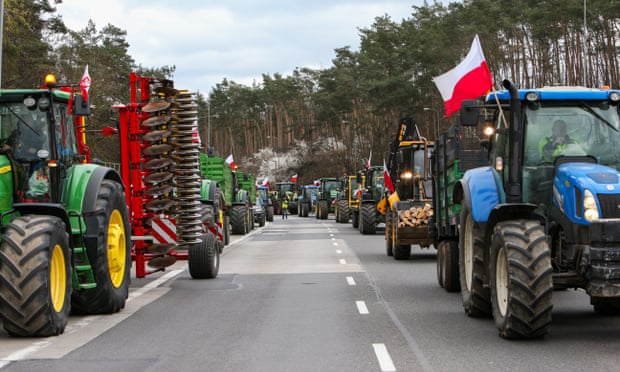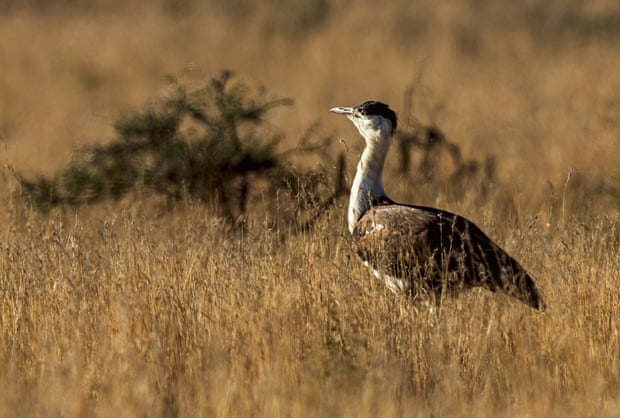For a moment I thought it was going to be a dodo
Rewilding & Conservation News and Discussions
Re: Rewilding & Conservation News and Discussions
Landmark UN Report Reveals Shocking State of Wildlife: The World’s Migratory Species of Animals are in Decline, and the Global Extinction Risk is Increasing
February 12, 2024
Introduction:
To review the report: https://www.cms.int/sites/default/files ... rt_E.pdf
February 12, 2024
Introduction:
Read more of the Eurekalert article here: https://www.eurekalert.org/news-releases/1032878(Eurekalert) The first-ever State of the World’s Migratory Species report was launched today by the Convention on the Conservation of Migratory Species of Wild Animals (CMS), a UN biodiversity treaty, at the opening of a major UN wildlife conservation conference (CMS COP14). The landmark report reveals:
• While some migratory species listed under CMS are improving, nearly half (44 per cent) are showing population declines.
• More than one-in-five (22 per cent) of CMS-listed species are threatened with extinction.
• Nearly all (97 per cent) of CMS-listed fish are threatened with extinction.
• The extinction risk is growing for migratory species globally, including those not listed under CMS.
• Half (51 per cent) of Key Biodiversity Areas identified as important for CMS-listed migratory animals do not have protected status, and 58 per cent of the monitored sites recognized as being important for CMS-listed species are experiencing unsustainable levels of human-caused pressure.
• The two greatest threats to both CMS-listed and all migratory species are overexploitation and habitat loss due to human activity. Three out of four CMS-listed species are impacted by habitat loss, degradation and fragmentation, and seven out of ten CMS-listed species are impacted by overexploitation (including intentional taking as well as incidental capture).
To review the report: https://www.cms.int/sites/default/files ... rt_E.pdf
Don't mourn, organize.
-Joe Hill
-Joe Hill
Re: Rewilding & Conservation News and Discussions
Reforestation Has Protected Eastern States from Temperature Rise
by Oliver Milman
February 23, 2024
Introduction:
caltrek’s comment: I obtained a sense of this when I was shown a parcel in Maine that included evidence of previous farming where that piece of land was now completely covered in trees. At the time, that came as a surprise to me.
by Oliver Milman
February 23, 2024
Introduction:
Read more here: https://www.motherjones.com/environmen ... -states/(Mother Jones) Trees provide innumerable benefits to the world, from food to shelter to oxygen, but researchers have now found their dramatic rebound in the eastern US has delivered a further, stunning feat—the curtailing of the soaring temperatures caused by the climate crisis.
While the US, like the rest of the world, has heated up since industrial times due to the burning of fossil fuels, scientists have long been puzzled by a so-called “warming hole” over parts of the US south-east where temperatures have flatlined, or even cooled, despite the unmistakable broader warming trend.
A major reason for this anomaly, the new study finds, is the vast reforestation of much of the eastern US following the initial loss of large numbers of trees in the wake of European settlement in America. Such large expanses have been reforested in the past century—with enough trees sprouting back to cover an area larger than England—that it has helped stall the affect of global heating.
“The reforestation has been remarkable and we have shown this has translated into the surrounding air temperature,” said Mallory Barnes, an environmental scientist at Indiana University who led the research. “The ‘warming hole’ has been a real mystery and while this doesn’t explain all of it, this research shows there is a really important link to the trees coming back.”
There was a surge in deforestation from the start of the US’s early colonial history, as woodland was razed for agriculture and housing, but this began to reverse from around the 1920s as more people began to move into cities, leaving marginal land to become populated again with trees. The US government, meanwhile, embarked upon an aggressive tree-planting program, with these factors leading to about 17 million acres of reforested area in the past century in the eastern US.
caltrek’s comment: I obtained a sense of this when I was shown a parcel in Maine that included evidence of previous farming where that piece of land was now completely covered in trees. At the time, that came as a surprise to me.
Don't mourn, organize.
-Joe Hill
-Joe Hill
-
weatheriscool
- Posts: 13583
- Joined: Sun May 16, 2021 6:16 pm
Re: Rewilding & Conservation News and Discussions
The World’s Rarest Fish Is Making A Comeback, One Ridiculous Baby At A Time
by Rachael Funnel
March 21, 2024
Introduction:
by Rachael Funnel
March 21, 2024
Introduction:
Read more here, including photographs: https://www.iflscience.com/the-worlds- ... ime-73476(IFL Science) Behold, the rarest fish in the world! The red handfish, Thymichthys politus, is known from just two small patches of reef off the coast of Tasmania, thought to be home to around 100 adults. Habitat degradation and climate change have threatened them with extinction, but thanks to a breeding program, they welcomed 21 hatchlings in 2023.
It was the second time red handfish have been successfully bred in captivity, and gave rise to a new generation that represented a quarter of their wild population. Mother handfish will care for their eggs until they hatch after around 50 days.
The goal? To release these babies into the wild and bolster the wild breeding population. However, before they can swim in the big blue, they've got to graduate handfish school.
“Handfish school is an initiative funded by our supporters at Foundation for Australia’s Most Endangered species, and its purpose is to develop ‘street smart’ skills for handfish that have been raised in captivity,” University of Tasmania handfish experts Dr Jemina Stuart-Smith and Dr Andrew Trotter told IFLScience.
It includes introducing more complex habitats, other species, and conditions that they’re likely to encounter in the wild. It’s really an acclimation period that provides an opportunity for fish to learn natural behaviours such as finding food, seeking shelter, interacting with conspecific species, and navigating in the sea. The purpose is to increase their chances of survival upon release.”
Don't mourn, organize.
-Joe Hill
-Joe Hill
- Time_Traveller
- Posts: 2234
- Joined: Sun May 16, 2021 4:49 pm
- Location: San Francisco, USA, June 7th 1929 C.E
Re: Rewilding & Conservation News and Discussions
More news on this: -caltrek wrote: ↑Thu Dec 14, 2023 10:32 pm How Can Europe Restore Its Nature?
December 14, 2023
Introduction:Read more here: https://www.eurekalert.org/news-releases/1011203(Eurekalert) The ‘Nature Restoration Law’ (NRL) requires member states of the EU to implement restoration measures on at least 20 per cent of land and marine areas by 2030, and in all ecosystems in need of restoration by 2050. This includes specific targets to rewet peatlands and to increase pollinator populations. The NRL has already overcome various hurdles: most recently, it was approved by the EU Parliament’s Environment Committee, after delegations of the Parliament and the Council negotiated the final text.
But will the regulation really achieve its aims? The authors, including scientists leading large European projects on nature restoration and biodiversity, analysed experiences with other European environmental directives and policies, and evaluated the prospects of the NRL to be successful.
“The NRL avoids several pitfalls that often obstruct the implementation of European policies and regulations, showing that the Commission learned from past experiences” says Prof. Dr Daniel Hering from the University of Duisburg-Essen, first author of the study. “The regulation sets ambitious targets and timelines, and implementation steps are clearly laid out. It also saves time as it does not need to be transposed into national law.” At the same time, national implementation will be crucial for the NRL’s success. “While targets are precisely defined and binding, the steps to achieve them need to be decided by individual European countries and most of them are voluntary” says Prof. Dr Josef Settele from Helmholtz Centre for Environmental Research (UFZ), one of the study’s authors.
Key to the implementation will be the cooperation of nature restoration with land users, in particular with agriculture. “Intensive agriculture is still a key driver for biodiversity loss in Europe”, says senior author Dr Guy Pe’er. “But targets for agriculture and nature restoration could be coordinated, with opportunities for both”. Agriculture directly benefits from healthy soils and pollinator populations and from increased water storage capacity in the landscape that are all targets of the NRL.
The authors conclude that funds provided by the EU’s Common Agricultural Policy need to be used for achieving the NRL’s aims: a statement to be intensively debated in science and application.
EU nature restoration laws in balance as member states withdraw support
https://www.theguardian.com/world/2024/ ... aw-supportMon 25 Mar 2024 13.41 GMT
The EU’s nature restoration laws are hanging in the balance after a number of member states, including Hungary and Italy, withdrew support for the legislation.
Spain’s environment minister, Teresa Ribera, said it would be “enormously irresponsible” for countries to drop the laws, which have been two years in the making and are designed to reverse decades of damage to biodiversity on land and in waterways.
But a vote at a summit of environment ministers in Brussels on Monday was cancelled after it became apparent that the legislation would not pass its final stage with the majority vote required.
The setback is not the first to hit the EU’s environmental agenda, as policymakers decide how to respond to farmers’ protests. As the protests continue – and in advance of the European parliament’s elections in June – many green rules have already been weakened.
“It would be enormously irresponsible to drop the entire European green agenda. Europe cannot afford to drop the green agenda, just as it cannot afford to let its ecosystems die or leave its system in poor condition, in a state of danger,” said Ribera.
"We all have our time machines, don't we. Those that take us back are memories...And those that carry us forward, are dreams."
-H.G Wells.
-H.G Wells.
- Time_Traveller
- Posts: 2234
- Joined: Sun May 16, 2021 4:49 pm
- Location: San Francisco, USA, June 7th 1929 C.E
Re: Rewilding & Conservation News and Discussions
‘Enormously exciting’: farm to create biggest natural grassland in southern England
https://www.theguardian.com/environment ... rn-englandFri 29 Mar 2024 12.00 GMT
The rolling hills south of Salisbury Plain are a bleak scene of vast arable fields and tightly grazed pasture dotted with scores of sheep.
In recent decades, Lower Pertwood farm has embraced organic growing, producing oats, barley and other crops, while boosting numbers of rare corn buntings and other wildlife with wildflower banks and newly planted trees.
But as wildlife continues to decline in Wiltshire and the farm’s profits plummet amid an increasingly unpredictable climate, the owners are turning to farming nature instead.
The 2,800-acre arable farm begins its transformation this spring into the biggest grassland rewilding project in southern England, in an attempt to restore declining plants, insects and endangered species including cuckoos, grasshopper warblers and turtle doves.
Perhaps as few as 250 individual great Indian bustards survive. Photograph: Journey with my kaleidoscope/Getty Images
The “Pertwood Plain” project, masterminded by Restore, a land management company specialising in large-scale restoration led by the naturalist Benedict Macdonald, will ultimately see low densities of pigs and cattle roaming free to recreate flower-rich chalk grassland. This naturalistic grazing, alongside interventions such as adding green hay and brash piles where birds perch and excrete seeds into the soil, will give rise to a mosaic of grass and scrubland teeming with invertebrate life.
"We all have our time machines, don't we. Those that take us back are memories...And those that carry us forward, are dreams."
-H.G Wells.
-H.G Wells.
-
weatheriscool
- Posts: 13583
- Joined: Sun May 16, 2021 6:16 pm
-
firestar464
- Posts: 824
- Joined: Wed Oct 12, 2022 7:45 am
Re: Rewilding & Conservation News and Discussions
eDNA methods give a real-time look at coral reef health
https://phys.org/news/2024-04-edna-meth ... -reef.html
https://phys.org/news/2024-04-edna-meth ... -reef.html

